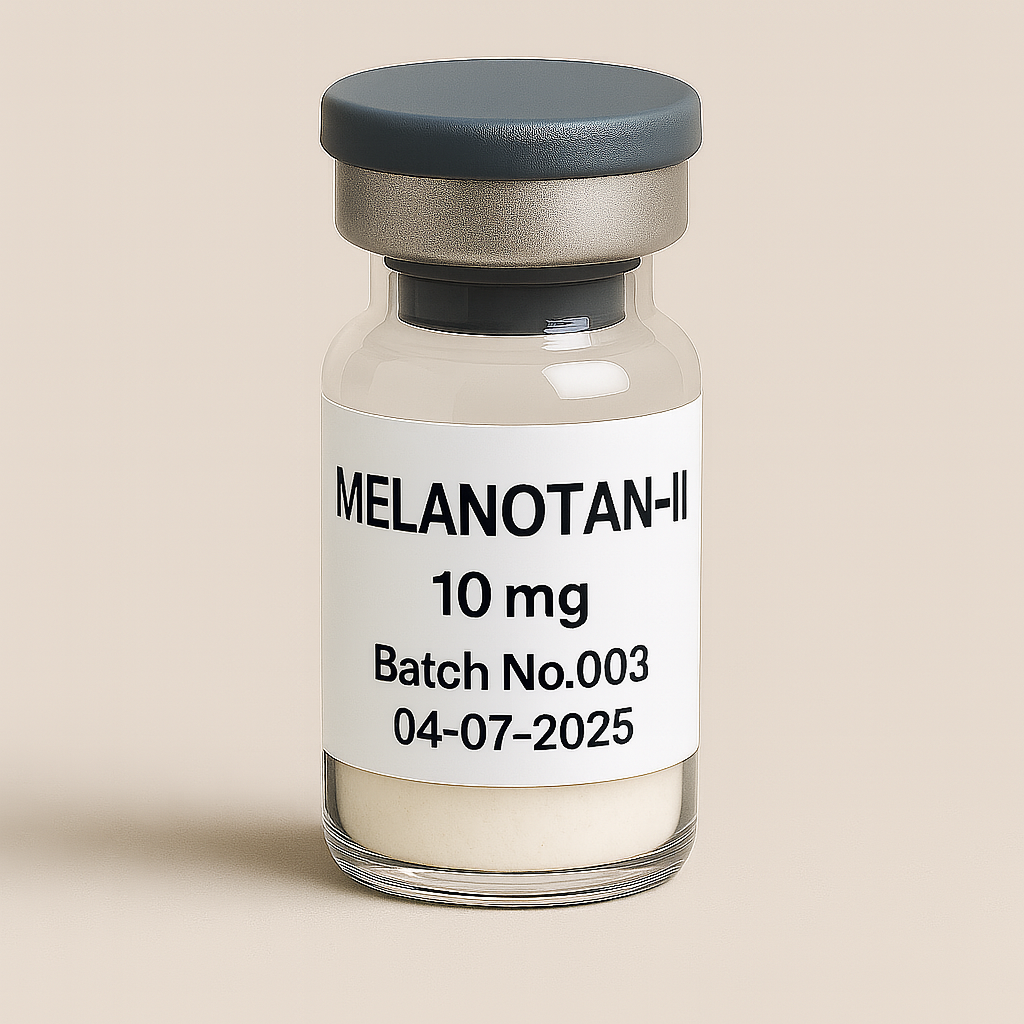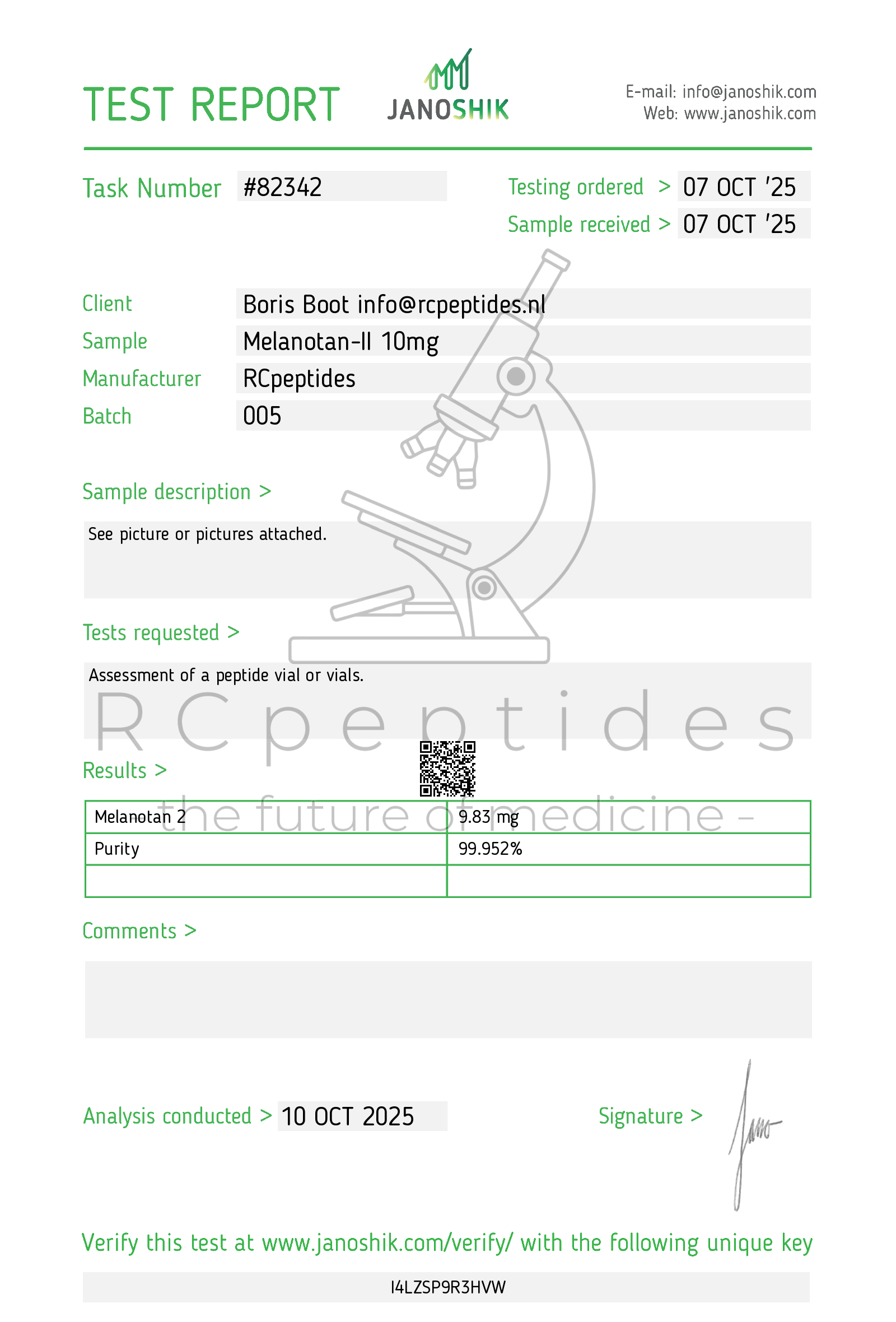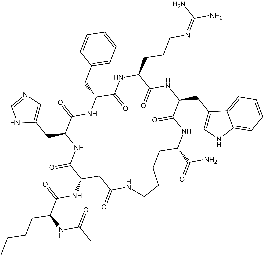
Melanotan-II 10mg vial
Pickup currently not available
NOT FOR HUMAN CONSUMPTION
Melanotan-II (MT-II) is a synthetic cyclic heptapeptide analog of the naturally occurring alpha-melanocyte-stimulating hormone (-MSH). It was originally developed as a tanning agent—stimulating melanin production to darken skin pigmentation—and has also been studied for its potential aphrodisiac and sexual function–enhancing effects.
-
Common Names: Melanotan-II, MT-2, MT-II
-
Chemical Classification: Synthetic peptide analog of -MSH (melanocortin receptor agonist)
-
Administration: Primarily subcutaneous injection, though nasal spray forms are sometimes sold (with questionable absorption)
2. Mechanism of Action
MT-II binds to and activates melanocortin receptors (notably MC1R and MC4R). These receptors are involved in:
-
Melanogenesis (Skin Pigmentation)
-
MC1R activation in melanocytes increases the production of melanin, the pigment responsible for skin tanning and hair color.
-
-
Libido and Sexual Arousal
-
MC4R activation is implicated in sexual function and energy homeostasis. Some individuals report stronger libido and erections.
-
-
Appetite and Energy Regulation
-
Certain melanocortin receptors influence satiety and metabolism.
-
3. Potential Benefits and Uses
-
Tanning / Skin Pigmentation
-
Main Intended Effect: MT-II can increase melanin production, potentially providing a tanned appearance with less sun exposure and possibly some photoprotection against harmful UV rays.
-
Research Context: Initial research at the University of Arizona aimed to reduce the incidence of skin cancer by inducing tanning (protective melanin) without excessive UV exposure.
-
-
Sexual Enhancement
-
In both men and women, anecdotal and some clinical evidence suggest increased libido and arousal.
-
Erectile Function: MT-II has been studied in erectile dysfunction contexts and sometimes used off-label for this reason.
-
-
Appetite Suppression (Anecdotal)
-
Some users report decreased hunger, though this effect is variable.
-
4. Administration and Dosing (Experimental / Anecdotal)
Disclaimer: No standardized, FDA-approved dosing guidelines exist for Melanotan-II. The information below is derived from unregulated use, anecdotal reports, and limited research.
-
Subcutaneous Injection: Most commonly used route.
-
Typical “Starter” Dose: Ranges from 0.25 to 0.5 mg daily or every other day. Users often start low to gauge tolerance.
-
Maintenance Dose: Once desired skin tone is achieved, some individuals reduce frequency to 0.25–1 mg per week.
-
Loading Phase: Higher-frequency, small daily doses (0.25–0.5 mg) for 1–2 weeks until desired pigment is noticed, followed by a maintenance phase.
Key Considerations
-
Individual Variation: Skin type, body weight, and general tolerance vary widely.
-
UV Exposure: Users typically still expose themselves to some UV (sunlight or tanning beds) to “activate” melanin production more effectively.
-
Over-Darkening or Hyperpigmentation: Excess use can cause uneven pigmentation or darkening of moles, freckles, and possible hyperpigmentation patches.
5. Safety Profile and Potential Side Effects
5.1. Common Side Effects
-
Nausea and Flushing: A characteristic “flushing” feeling and mild nausea often accompany doses, especially at higher amounts.
-
Appetite Changes: Appetite suppression (most common) or occasionally mild stomach discomfort.
-
Facial Flushing / Redness: Particularly shortly after administration.
5.2. Pigmentation Irregularities
-
Darkening of Moles and Freckles: Existing moles, freckles, and even new pigmented spots may appear or darken.
-
Uneven Tanning: Some users experience blotchy or uneven skin tone.
5.3. Sexual Arousal Effects
-
Spontaneous Erections / Enhanced Libido: Can be desirable or, in some contexts, inconvenient.
5.4. Potential Long-Term Risks
-
Melanoma Risk: Conflicting discussion on whether artificially increasing melanin could mask or potentially exacerbate underlying skin lesions.
-
Unknown Long-Term Effects: There is a lack of extensive, long-term human data on continuous MT-II use.
-
Cardiovascular or Metabolic Effects: Minimal data, but caution is advised given the melanocortin system’s role in metabolic regulation.
5.5. Contraindications
-
Pregnant / Nursing Women: Insufficient data, not recommended.
-
Pre-Existing Skin Cancers: Significant concern due to unknown impact on melanocytic neoplasms.
-
Serious Cardiovascular Conditions: Potential metabolic or blood pressure interactions.
6. Product Quality and Sourcing Concerns
Because Melanotan-II is unregulated in most countries:
-
Purity / Potency: Products sold online often lack third-party testing.
-
Contamination: Peptide powders may contain impurities, bacterial endotoxins, or other adulterants.
Safety Tip: Individuals seeking MT-II for any reason should verify product quality, review reputable sources, and consult a healthcare professional before use.
7. Legal and Regulatory Status
-
United States: Melanotan-II is not approved by the FDA for tanning or any medical usage. Often sold on the gray market or labeled “for research only.”
-
Europe & Other Regions: Similarly unapproved. Regulatory bodies issue health warnings about unlicensed usage.
-
WADA (Sports Doping): Not specifically listed as a banned substance, but athletes should confirm with updated doping guidelines and note possible doping test complications if used for performance enhancement of any kind.
8. Current Research and Clinical Trials
-
Early, limited clinical research explored MT-II for sexual dysfunction (e.g., erectile dysfunction) and protective tanning.
-
Minimal large-scale, peer-reviewed, long-term studies exist due to regulatory and patent constraints, so safety and efficacy profiles are still not fully established.
Notable Studies
-
Hadley ME, et al. (1998). Explored the tanning effects and potential for melanoma prevention.
-
Wessells H, et al. (2000). Studied the pro-erectile effects of MT-II in men with erectile dysfunction.
9. Summary: Benefits vs. Risks
| Potential Benefits | Potential Risks / Drawbacks |
|---|---|
| Enhanced tanning with less UV exposure | Nausea, flushing, and potential adverse skin effects |
| Possible protective melanin boost | Unknown long-term melanoma risk |
| Increased libido / sexual arousal | Irregular pigmentation, moles / freckles darkening |
| Reduced appetite (anecdotal) | Unregulated product sources and purity concerns |
Melanotan-II can produce a tanned appearance and may enhance sexual desire, but unregulated use, unknown long-term risks, and possible adverse skin effects warrant caution.
References
-
Hadley ME, et al. (1998). “Melanotan II (MT-II): Effects on skin pigmentation and sexual function.” Annals of the New York Academy of Sciences.
-
Wessells H, et al. (2000). “Melanocortin receptor agonists, sexual function, and erectile dysfunction.” International Journal of Impotence Research.



